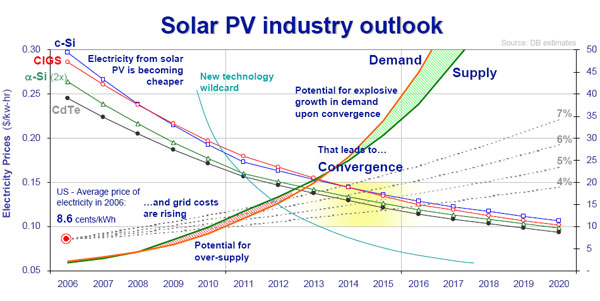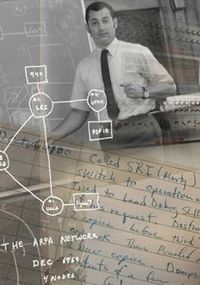Think of this as Volume 15, Number 47 of A-Clue.com, the online newsletter I've written since 1997. Enjoy.
Here's a date to put in your calendar. 2016.
That's the year, give or take, when solar energy becomes the cheap energy. That's when efficiency on every level – panels, materials, installation, channels – reaches a point where it's cheaper to buy-and-install one than to buy electricity from the meter.
That's also the year when, I predict, you'll start seeing solar systems at places like Home Depot and Lowe's. They won't look like today's panels. They'll be Building Integrated PhotoVoltaics – things you can slap on a wall, a door, a window, plug in, and get juice from. These are the PCs of the new industry.
Fossil fuel advocates are doing everything they can to put off this day:
-
They're attacking the industry for its subsidies (while keeping quiet about their own).
-
They're selling the idea of cheap, abundant natural gas (while ignoring the dangers of fracking).
-
They're pushing for commitments on nuclear power and pipelines to capture oil shale.
All these efforts are, in the short run, fairly successful. The oil industry has vast wealth. It can buy government support.
But in the end it fails. Moore's Law wins, as it always has in the past.

-
The cost of energy rolls over. Instead of “peak energy,” I'm talking here of “peak energy pricing.” Suddenly there's a thumb being placed down on the cost of oil.
-
Projects start getting canceled. It will start first, with oil shale and tar sand projects, which cost the most to bring to market. It will then start moving toward offshore projects with high fixed costs – risks to their financial structure will start to rise.
- Houston Goes Green — Energy companies start investing heavily in geothermal projects as they see other forms of energy falling in price. This has a profound impact on that part of the market, which badly needs Houston's technological expertise in order to grow, getting closer to the source of the Earth's heat.
-
Africa Grows. Combine cheap solar technology with cheap wireless Internet and you've brought many countries to the forefront of the world market. Most important labor can come to market, from any country sporting enough political stability to reassure investors.
-
Labor Values Increase. With energy prices no longer rising, the value of human capital starts to rise. A virtuous cycle is created with rising incomes for trained minds, and the democratization of training made possible by technologies in place now.

But how do you grow a company with energy prices that have peaked, and are heading slowly downward? You invest in technology in order to increase the productivity of workers, sure. You don't stop looking for energy efficiency because it's now starting to pay off. But there are limits to both these things.
What you do is look to creating and building new markets. That takes people. The smarter the better. You can even afford some training for people. You start competing for them.

All these events are possible once we have crossover. Once solar energy becomes the cheap energy, it's merely a case of scaling production in order to drive other energy prices downward, and to start restricting capital flows to those projects. Restricting those flows will become essential to maintaining prices, after all. An industry that has always practiced the politics of scarcity will start creating scarcity itself.
These are the mega-trends of our time. The cost of solar panels is declining. It's not just that their efficiency is rising, slowly. It's that their production costs are falling, we're finding new materials and technologies for building them, new ways to manufacture them cheaply. We're finding new, cheaper ways to install them and put them into production, and new channels are opening up that cost less-and-less.

But that's not the way markets work. Real crossover only occurs when absolute market prices cross. It's a long-term process. Crossover in prices is just the first step in what's to come, because the industry still has to scale to produce as much energy as our grid needs, as much as our transport sector needs. Those things will happen, in time.
But crossover is the first step. And the news today is that it's within our reach.












The problem is First Solar will be gone and all remaining players will have a Chinese accent
The problem is First Solar will be gone and all remaining players will have a Chinese accent
That’s not going to happen. As demand outstrips supply, new technologies will emerge that can beat anything China comes out with.
And so what if it does. You’re going to keep burning coal because some Chinaman has better solutions? You’ll buy some, but you’ll also see the opportunity before you and seize it.
That’s not going to happen. As demand outstrips supply, new technologies will emerge that can beat anything China comes out with.
And so what if it does. You’re going to keep burning coal because some Chinaman has better solutions? You’ll buy some, but you’ll also see the opportunity before you and seize it.
Solar power should be the most abundant form of energy resources. Sunlight is limitless and very much free. We should harness its energy and put it all into use.
Solar power should be the most abundant form of energy resources. Sunlight is limitless and very much free. We should harness its energy and put it all into use.
power
Dana Blankenhorn: Crossover
Ava Watson
Dana Blankenhorn: Crossover